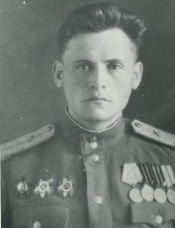
The Presidential Library traced the path of a veteran from Leningrad Region to Manchuria
The Presidential Library continues telling about the fate of residents and defenders of besieged Leningrad in the framework of a joint campaign with the newspaper Petersburg Diary and Radio Rossiya - St. Petersburg.
One of the heroes is Nikolai Pavlovich Massonov (1918–2006), who began to fight in Leningrad Region and finished it far away in Manchuria. He faced the Great Patriotic War in the 18th naval aviation squadron, which was engaged in the protection of the airfield near the village of Koporye near Leningrad. At the end of July 1941, the fighter was sent to the 1st battalion of the 5th Marine Brigade at the Oranienbaum bridgehead. The unit was given the hard task of stopping the German offensive in the area of the Voronka River. And, despite the desperate attempts to break through the defence and heavy losses on both sides, the attack of the enemy was stopped. Masson received a concussion in these battles.
In early 1942, Nikolai graduated from the course of junior lieutenants and was divided into a separate mortar division, which participated in the battles on the Oranienbaum and Ivanovo bridgeheads and under Kolpino. In 1943–1944, already in the 622nd Regiment of the 124th Infantry Division, Massonov fought for Sinyavino Heights, Mga, Otradnoe, Tosno.
Then there was the 3rd Belorussian Front, fighting for Konigsberg. After the victory over Nazi Germany, Massonov was transferred to the other end of the continent - to Manchuria, to the war with Japan, which ended on September 2, 1945.
Nikolai Pavlovich Massonov was awarded three orders of the Patriotic War, two orders of the Red Star, medals "For the Defence of Leningrad", "For Military Merit", "For the capture of Konigsberg", "For the victory over Germany" and "For the victory over Japan".
A special place in the life of Nikolai Massonov belonged to the siege. In the winter of 1942, in the besieged city, his grandfather and grandmother, aunt and two nephews died of starvation, the other lost her three children. Two uncles and several cousins died on the front ...
Massonov left memories of the siege in the memoirs of veterans of the 124th rifle division "The Word of a Veteran". There, in particular, he writes about the difficulties in supplying the fighters of the Leningrad front with food in October 1941: “We were first fed pea soup with a small piece of horse meat and a piece of sugar twice a day - in the morning and in the evening, and then rye flour soup, we was called it a talker, and instead of bread they often gave crackers. From exhaustion, many soldiers, including me, suffered from night blindness and other diseases. It was in such conditions that the soldiers defended their homeland and smashed the fascists at the front”.
Among the 2500 documents about the siege and the defence of Leningrad, which entered the Presidential Library since November last year, are the story of a submariner with lines from his last letter, a photograph that allowed more than 70 years later to find out what the Soviet soldier looked like, a message to the past addressed to the deceased brother, works of Leningrad schoolchildren, written in the harshest winter of 1941/42, a diary that interested the author of The Two Captains by Benjamin Kaverin, etc.
Let us add that with the participation of the Presidential Library in St. Petersburg the Unified City Information Center, which coordinates the coverage of events dedicated to the 75th anniversary of the complete liberation of Leningrad from the Nazi siege, has been established. The Presidential Library’s portal provides access to a virtual tour of the exhibition halls of the temporarily closed State Museum of Defence and Siege of Leningrad and get familiar with the electronic collection “Defence and Siege of Leningrad”, which includes official documents, periodicals, memories of Leningrad citizens, food cards, photo and newsreels.

